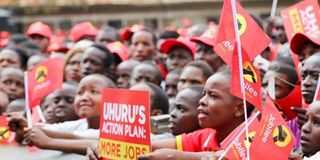Jubilee’s vulnerability to declining political capacity exposed

Jubilee supporters during the 2017 election campaigns. FILE PHOTO
What you need to know:
What actually is political capacity? Notably, the concept of “political capacity” has a recent usage — although the phenomenon is as old as the hills.
Truth be told, despite lip-service to “Kenyan nationalism”, the political class has trained its whole focus on building political capacity around ethnic formations to capture state power.
Political capacity is everything. It is to nations and empires what oxygen is to fire. Its ebbs and flows determine the rise and fall of great powers. This maxim found its best expression in last Thursday’s chaotic parliamentary vote on a raft of new taxes.
President Uhuru Kenyatta won the September 20, 2018 vote on strategy, not the numbers — 134 MPs stayed out while the majority (215) opposed the taxes. However, in its aftermath, the vote has exposed the vulnerability of the Jubilee political formation to weak political capacity ahead of a crucial change of guard in 2022.
POLITICAL CAPACITY
Prior to the vote, the “Young Democrats”, a network of the youth wing of the Democratic Party of Kenya, had invited me to deliver a keynote speech on the state of politics in the Mount Kenya region on the road to 2022 during their dinner. I elected to reflect on the ebbs and flows of “political capacity” in the region within the larger canvas of Kenya’s ethnically divided society.
But what, actually, is political capacity? Notably, the concept of “political capacity” has a recent usage — although the phenomenon is as old as the hills.
In a nutshell, it refers to “the government's ability to extract, allocate and reallocate public revenue from one sector to the other”. The fragmentation of the nationalist elite and the tragic collapse of the nationalist consensus in the 1960s political capacity pivoted from states and governments to ethnic formations.
Truth be told, despite lip-service to “Kenyan nationalism”, the political class has trained its whole focus on building political capacity around ethnic formations to capture state power.
Irrespective of their numbers, those ethnic formations that over the years have invested in building political capacity are punching above their weight in national political contests. Smaller groups are building their power on four immutable facts.
'TYRANNY OF NUMBERS'
First, building political capacity is a conscious and deliberate effort to invest political resources. Two, political capacity is built over generations, not in five years to win one election. Third, political capacity is not about numbers — the so-called "tyranny of numbers”; it is about strategy, focus and determination to build viable structures for policy-making and mobilisation.
Finally, political capacity is about controlling the “commanding heights” of power. For Vladimir Lenin, when introducing the New Economic Policy in the Soviet Union in 1921, the "commanding heights” of the economy are large-scale industry, foreign trade, banking, and transport, which he ruled were to be managed by the state.
In the digital age, a strong ICT capacity over and above knowledge production (big data) and financial capital (banks, industry and trade sectors) are the new “commanding heights” of power.
Inversely, ethnic formations huge demographic prowess but ignored investing in strong political capacity are gradually becoming veritable” for the elite of smaller groups with huge political resources in the jostling for state power in the run-up to 2022.
This is the plight of the Mount Kenya region. Here, upon coming to power in 1960s, Mzee Jomo Kenyatta shifted the axis of power from purely political institutions such as the ruling Kanu to the state bureaucracy, mainly Provincial Administration (now National Administration).
Although GEMA was formed as a potential pivot of regional politics, its mercantilist orientation stifled the rise of any significant political capacity around it.
In 2002, the Mount Kenya region was in power again, but totally failed to invest in political capacity. Ahead of the 2007 election, President Mwai Kibaki had state power, but no political vehicle for his re-election! The Party of National Unity (PNU), created three months to the polls, lacked the capacity to defend his victory! He had to share power.
'RETAINING POWER'
After 2007, the region accented the “tyranny of numbers” as the new theory of capturing and retaining power. A ludicrous obsession with this “biological strategy" has reached frenetic and absurd levels. One MP went as far as offering monetary rewards to women in her constituency for getting pregnant! Yet, the British whose population reached 65.64 million (out of a total 7.442 billion human population) only in 2016 managed to conquer and rule a sprawling empire where “the sun never set”!
In contrast, it is the elite of smaller communities that realised that numbers do not matter. Jaramogi Oginga Odinga built a formidable political loyalty and capacity on the structures and networks of the Luo Thrift and Trading Company, enabling him to hue a powerful dynasty in Luo Nyanza poised to shape the future of power in 2022.
Similarly, Daniel Moi (1978-2002) struck a balance between state power and ethnic-based political capacity anchored on a refurbished ruling party (Kanu) machine. His strategists revamped the powerful cultural networks, institutions and platforms that united the 11 Kalenjin sub-tribes into a new powerful “deep state” within the “Kalenjin Nation”.
In the Mount Kenya region, decades of failure to build political capacity is coming home to roost.
Professor Peter Kagwanja is a former Government Adviser and currently Chief Executive of Africa Policy Institute.




